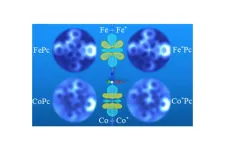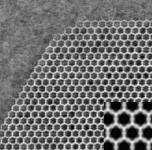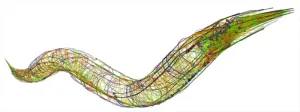(Press-News.org) ITHACA, N.Y. – A Cornell University-led experiment in which two people play a modified version of Tetris revealed that players who get fewer turns perceived the other player as less likable, regardless of whether a person or an algorithm allocated the turns.
Most studies on algorithmic fairness focus on the algorithm or the decision itself, but researchers sought to explore the relationships among the people affected by the decisions.
“We are starting to see a lot of situations in which AI makes decisions on how resources should be distributed among people,” said Malte Jung, associate professor of information science, whose group conducted the study. “We want to understand how that influences the way people perceive one another and behave towards each other. We see more and more evidence that machines mess with the way we interact with each other.”
In an earlier study, a robot chose which person to give a block to and studied the reactions of each individual to the machine’s allocation decisions.
“We noticed that every time the robot seemed to prefer one person, the other one got upset,” said Jung. “We wanted to study this further, because we thought that, as machines making decisions becomes more a part of the world – whether it be a robot or an algorithm – how does that make a person feel?”
Using open-source software, Houston Claure – the study’s first author and postdoctoral researcher at Yale University – developed a two-player version of Tetris, in which players manipulate falling geometric blocks in order to stack them without leaving gaps before the blocks pile to the top of the screen. Claure’s version, Co-Tetris, allows two people (one at a time) to work together to complete each round.
An “allocator” – either human or AI, which was conveyed to the players – determines which player takes each turn. Jung and Claure devised their experiment so that players would have either 90% of the turns (the “more” condition), 10% (“less”) or 50% (“equal”).
The researchers found, predictably, that those who received fewer turns were acutely aware that their partner got significantly more. But they were surprised to find that feelings about it were largely the same regardless of whether a human or an AI was doing the allocating.
The effect of these decisions is what the researchers have termed “machine allocation behavior” – similar to the established phenomenon of “resource allocation behavior,” the observable behavior people exhibit based on allocation decisions. Jung said machine allocation behavior is “the concept that there is this unique behavior that results from a machine making a decision about how something gets allocated.”
The researchers also found that fairness didn’t automatically lead to better game play and performance. In fact, equal allocation of turns led, on average, to a worse score than unequal allocation.
“If a strong player receives most of the blocks,” Claure said, “the team is going to do better. And if one person gets 90%, eventually they’ll get better at it than if two average players split the blocks.”
“The Social Consequences of Machine Allocation Behavior: Fairness, Interpersonal Perceptions and Performance,” published in Computers in Human Behavior.
For additional information, see this Cornell Chronicle story.
Cornell University has dedicated television and audio studios available for media interviews.
-30-
END
Tetris reveals how people respond to unfair AI
2023-05-15
ELSE PRESS RELEASES FROM THIS DATE:
Distinct types of cerebellar neurons control motor and social behaviors
2023-05-15
The cerebellum, a major part of the hindbrain in all vertebrates, is important for motor coordination, language acquisition, and regulating social and emotional behaviors. A study led by Dr. Roy Sillitoe, professor of Pathology and Neuroscience at Baylor College of Medicine and investigator at the Jan and Dan Duncan Neurological Research Institute (Duncan NRI) at Texas Children’s Hospital, shows two distinct types of cerebellar neurons differentially regulate motor and non-motor behaviors during development and in adulthood.
The study, published in Nature Communications, provides the first in ...
Seeing electron orbital signatures
2023-05-15
No one will ever be able to see a purely mathematical construct such as a perfect sphere. But now, scientists using supercomputer simulations and atomic resolution microscopes have imaged the signatures of electron orbitals, which are defined by mathematical equations of quantum mechanics and predict where an atom’s electron is most likely to be.
Scientists at UT Austin, Princeton University, and ExxonMobil have directly observed the signatures of electron orbitals in two different transition-metal atoms, iron (Fe) and cobalt ...
Commercial investors shift perspective of coastal properties in face of climate change
2023-05-15
UNIVERSITY PARK, Pa. — Investors in commercial real estate are rethinking the values of coastal properties exposed to flood risk — even in northern U.S. locales that haven’t suffered flood damage, according to researchers. This shift in perspective has implications for investors and developers alike as they determine the value of coastal properties amid a changing climate.
Eva Steiner, associate professor of real estate and King Family Early Career Professor in Real Estate in the Penn State Smeal College of Business, and her co-authors published these findings recently in Real Estate Economics.
Steiner and ...
Luo to receive NSF funding for collaborative research: catholyte molecular design for non-aqueous mg-organic hybrid redox flow batteries
2023-05-15
Chao Luo, Assistant Professor, Chemistry and Biochemistry, is set to receive funding from the National Science Foundation for the project: "Collaborative Research: Catholyte Molecular Design For Non-Aqueous Mg-Organic Hybrid Redox Flow Batteries."
Luo is proposing a new organic molecule structure design concept for redox flow batteries, which are promising for grid-scale energy storage. The research outcomes will afford low-cost, abundant, sustainable, and high-performance organic catholyte materials for non-aqueous Mg-organic hybrid redox flow batteries.
His goal is to design, synthesize, and characterize core-shell ...
Huneke wins grant to research lesbians in the Third Reich
2023-05-15
Samuel Clowes Huneke, Assistant Professor, History and Art History, has been awarded a Sharon Abramson Research Grant from the Holocaust Educational Foundation of Northwestern University. The award will enable him to complete research for his forthcoming book on lesbians in Nazi Germany.
For many decades after the end of World War II, the fates of queer women were ignored. Because female homosexuality had not been criminalized explicitly, historians long argued that lesbians were not persecuted by the Nazi regime.
In contrast, Huneke’s book, which is under advanced contract with Aevo-University of Toronto Press, argues that queer women under Nazism faced ...
Porous crystals made from plant extracts purify water from pharmaceutical pollutants
2023-05-15
Researchers from Stockholm University have developed porous crystals made from pomegranate extract to capture and degrade pharmaceutical molecules found in local municipal wastewater. The research is published in the scientific journal Nature Water.
Pharmaceutical compounds affect the human body to improve our health, but they can also have unintentional adverse effects for the wellbeing of wildlife. Hence wastewater treatment plants are facing the challenge of removing emerging organic contaminants (EOCs) such as active pharmaceutical ingredients, and therefore ...
Butterfly tree of life reveals an origin in North America
2023-05-15
About 100 million years ago, a group of trendsetting moths started flying during the day rather than at night, taking advantage of nectar-rich flowers that had co-evolved with bees. This single event led to the evolution of all butterflies.
Scientists have known the precise timing of this event since 2019, when a large-scale analysis of DNA discounted an earlier hypothesis that pressure from bats prompted the evolution of butterflies after the extinction of dinosaurs.
Now, scientists have discovered where the first butterflies originated ...
From molecular to whole-brain scale in a simple animal, study reveals serotonin’s effects
2023-05-15
Because serotonin is one of the primary chemicals the brain uses to influence mood and behavior, it is also the most common target of psychiatric drugs. To improve those drugs and to invent better ones, scientists need to know much more about how the molecule affects brain cells and circuits both in health and amid disease. In a new study, researchers at The Picower Institute for Learning and Memory at MIT working in a simple animal model present a comprehensive accounting of how serotonin affects behavior from the scale of individual molecules all the way to the animal’s whole brain.
“There have been major challenges ...
Assessment of sociodemographics and inflation-related stress
2023-05-15
About The Study: This analysis of U.S. Census Bureau survey data found that rising inflation has become a significant source of stress, especially among women and those who were socioeconomically more vulnerable.
Authors: Cary Wu, Ph.D., of York University in Toronto, is the corresponding author.
To access the embargoed study: Visit our For The Media website at this link https://media.jamanetwork.com/
(doi:10.1001/jamanetworkopen.2023.13431)
Editor’s Note: Please see the article for additional information, including other authors, author contributions and affiliations, ...
Population-based estimates for the prevalence of multiple sclerosis in the US
2023-05-15
About The Study: In this national population-based cohort study of multiple sclerosis (MS) prevalence, researchers found that the distribution of MS in the United States has become more racially and ethnically diverse. White individuals continued to have the highest prevalence of MS followed by Black individuals, individuals from other races, and Hispanic individuals.
Authors: Mitchell T. Wallin, M.D., M.P.H., of the University of Maryland School of Medicine in Washington, D.C., is the corresponding author.
To access the embargoed study: Visit our For The Media website at this link https://media.jamanetwork.com/
(doi:10.1001/jamaneurol.2023.1135)
Editor’s ...



